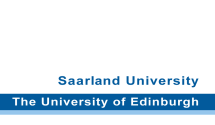|
Frequently Asked Questions
International Research Training Group
- You're saying that the training group is a joint activity
of Saarland University and the University of Edinburgh,
and that PIRE is a co-operation with Johns Hopkins, Brown
and Charles University, Prague. Does this mean I get a
joint PhD degree from two universities?
No, you don't. Those students who get scholarships from these
programmes will be enrolled as PhD students in one of the
participating fields (computational linguistics, computer science,
phonetics) at Saarland University and will get their degree from here.
- I think language technology and cognitive systems are
really interesting, but I don't really have a background
in computational linguistics. Can I apply anyway?
Please do! There are really few people in the world who have a strong
background in all of the participating fields, and we want
to keep the programme open to people from all geographic and
thematic areas. We may expect you to take some courses in
your first year to bring you up to a common standard, though.
- I'm not quite finished with my degree. What
should I do?
You need to have a degree before you join the scholarship programme,
but you don't need to hold a degree to apply.
- I don't speak German, can I apply anyway?
You'll be fine with English as long as you move in academic circles,
and you can probably make yourself understood outside the
university in English or French. However, not speaking the
language of the country you live in severely limits the
chances for interacting with the normal people, so it would
make sense to take German courses. Such courses, as well as
introduction programmes for foreign students, are offered by
the university.
- What languages are acceptable for the certificates you
want me to send you?
German is clearly the language of choice, but English is okay too. If
your certificates are originally in a different language,
please have a certified translator translate them into one
of these two languages.
- How do you want the references again?
First, have two of your professors or teachers send letters of
reference directly to us. We strongly prefer getting them by
e-mail,
but if you must, regular mail works too (see address on the
main page). Second, include the names and addresses of these
two persons in your application so we know who to contact
when the letters aren't arriving.
|

